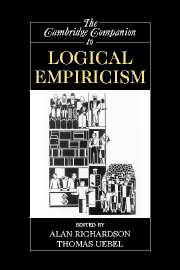Book contents
- Frontmatter
- Introduction
- Part I The Historical Context of Logical Empiricism
- Part II Logical Empiricism: Issues in General Philosophy of Science
- 4 Coordination, Constitution, and Convention: The Evolution of the A Priori in Logical Empiricism
- 5 Confirmation, Probability, and Logical Empiricism
- 6 The Structure of Scientific Theories in Logical Empiricism
- Part III Logical Empiricism and the Philosophy of the Special Sciences
- Part IV Logical Empiricism and its Critics
- Bibliography
- Index
- Series List
4 - Coordination, Constitution, and Convention: The Evolution of the A Priori in Logical Empiricism
from Part II - Logical Empiricism: Issues in General Philosophy of Science
Published online by Cambridge University Press: 28 January 2008
- Frontmatter
- Introduction
- Part I The Historical Context of Logical Empiricism
- Part II Logical Empiricism: Issues in General Philosophy of Science
- 4 Coordination, Constitution, and Convention: The Evolution of the A Priori in Logical Empiricism
- 5 Confirmation, Probability, and Logical Empiricism
- 6 The Structure of Scientific Theories in Logical Empiricism
- Part III Logical Empiricism and the Philosophy of the Special Sciences
- Part IV Logical Empiricism and its Critics
- Bibliography
- Index
- Series List
Summary
A standard picture of the conception of a priori knowledge developed within the logical empiricist tradition runs as follows. This conception arose primarily in the context of the philosophy of mathematics - where, in particular, it was intended to provide an alternative to the Kantian theory of synthetic a priori knowledge that would be both acceptable from an empiricist point of view and more adequate to mathematical practice than the simple-minded empiricism associated with John Stuart Mill. Here the logical empiricists found an answer in the logicist philosophy of mathematics of Gottlob Frege and Bertrand Russell, according to which mathematics is reducible to logic (the new mathematical logic developed by Frege and Russell) and is therefore analytic a priori, not synthetic a priori. There is thus no need of the Kantian faculty of pure intuition, and, at the same time, we can still (thanks to the richness and complexity of Frege's and Russell's new logic) do justice to both the a priority and the complexity of our actual mathematical knowledge. The heart of the logical empiricists' answer to Kant, therefore, is that his main example of synthetic a priori knowledge, pure mathematics, is not synthetic after all. All that we ultimately need to explain the possibility of pure a priori knowledge in the exact sciences is the analytic a priori.
- Type
- Chapter
- Information
- The Cambridge Companion to Logical Empiricism , pp. 91 - 116Publisher: Cambridge University PressPrint publication year: 2007
- 11
- Cited by



